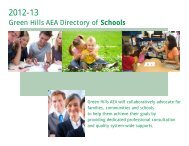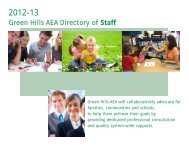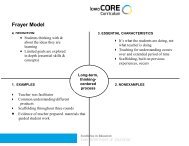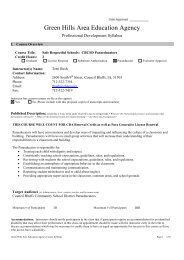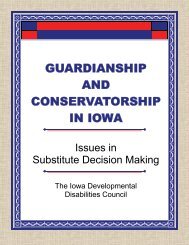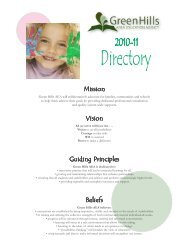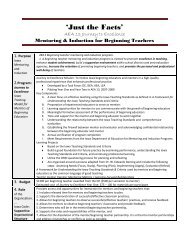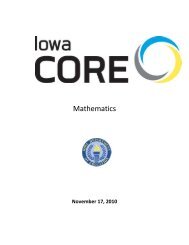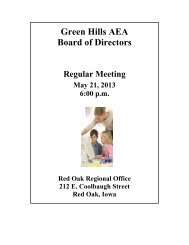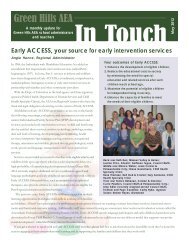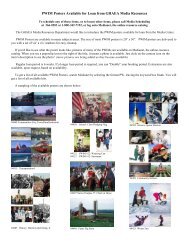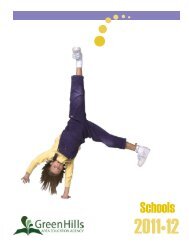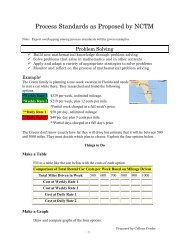Course Syllabus - Green Hills AEA
Course Syllabus - Green Hills AEA
Course Syllabus - Green Hills AEA
Create successful ePaper yourself
Turn your PDF publications into a flip-book with our unique Google optimized e-Paper software.
<strong>Green</strong> <strong>Hills</strong> Area Education Agency<br />
Professional Development <strong>Syllabus</strong><br />
I. <strong>Course</strong> Overview<br />
<strong>Course</strong> Title: Planning for Effective Instruction Using the SWH<br />
Credit Hours: 1<br />
Graduate License Renewal Substitute Authorization Paraeducator Evaluator Approval<br />
Instructor(s) Name: Lynn Hockenberry<br />
Contact Information:<br />
Address: 701 Walnut Street, Atlantic, IA 50022<br />
Phone: 712-249-1396<br />
Email:<br />
lhockenberry@ghaea.org<br />
Fax: 712-243-1493<br />
Instructor has current resume on file at this agency<br />
Yes No (Please include with this proposal copies of transcripts and resumes)<br />
Published Description: (Underline 2-5 key terms under which this may be categorized) • What are the instructional practices and strategies that<br />
participants will learn? • What are the potential results for student learning? • Are there any prerequisites?<br />
This course will provide opportunities for collaborative planning and preparation for effective instruction to facilitate<br />
student learning using the SWH approach. Participants will utilize Iowa Core Curriculum Essential Concepts and Skills<br />
to design and/or revise SWH units containing the big ideas of science and literacy curriculum, instruction and<br />
assessment through collegial collaboration and coaching.<br />
Target Audience (ie. Administrator, level, content, teacher, and licensure area)<br />
Classroom Teachers and Special Education Teachers involved in the Federal SWH grant<br />
Minimum # of Participants 10 Maximum # of Participants 100<br />
Accommodations: Instructors should notify participants in the class that if participants require an accommodation for an identified<br />
disability that may affect their performance in this class, an appointment should be made with the instructor early in the term to<br />
discuss accommodations which may be necessary to enable them to have as equal an opportunity for success in this course as those<br />
who do not have a disability.<br />
<strong>Green</strong> <strong>Hills</strong> Area Education Agency <strong>Course</strong> <strong>Syllabus</strong> Page 1 1/10
<strong>Green</strong> <strong>Hills</strong> Area Education Agency<br />
Professional Development <strong>Syllabus</strong><br />
Research/Best Practice to support course outcomes: Describe the scientific research base that supports the instructional strategies<br />
being learned in this course. Reference the Iowa Content Networks and/or other research sources using a bibliography format<br />
1) Hand, B.B., "Cognitive, Constructist Mechanisms for Learning Science Through Writing," In Writing<br />
and Learning in the Science Classroom, Wallace, C., Hand, B., Prain, V. Eds, Dordrecth, the Netherlands:<br />
Kluwer Academic Publishers, 2004. 2) Olson S. & Loucks-Horsley, S. (2000), "Inquiry and the National<br />
Science Education Standards: A Guide for Teaching and Learning," Committee on the Development of an<br />
Addendum to the National Science Education Participant Standards on Scientific Inquiry, Washington D. C.;<br />
National Research Council. http://www.nap.edu<br />
Outcomes/Objectives: List the knowledge and skills that participants will possess as a result of taking part in this course<br />
Participants will:<br />
1. Identify Iowa Core Curriculum Essential Concepts and Skills appropriate for science units of study.<br />
2. Articulate Science and Literacy Big Ideas in student friendly terms based on Iowa Core Curriculum<br />
Essential Concepts and Skills.<br />
3. Articulate big ideas for each unit as they develop teacher concept maps for their science units.<br />
4. Develop SWH units to be implemented during the the 2012-2013 school year.<br />
5. Analyze units based on "Targets for Implementation."<br />
Instructor Methods and <strong>Course</strong> Design: Insure that the course includes theory, demonstration, practice, and collaboration. List the<br />
methods to be used by the instructor and indicate how these will be distributed through the training. These methods might include: lecture, demonstration and<br />
modeling, individual/small group work, interaction with and use of technology. The expectaion is for all participants to engage in the follow through to support<br />
implemenation that is designed as part of the course. Appropriate differentiation will be determined by instructor<br />
1. Facilitate collaborative conversations around unit planning.<br />
2. Provide content sessions as necessary for grade level groups, individuals, and school buildings.<br />
3. Provide coaching to assist in SWH unit planning.<br />
4. Provide content sessions as needed/requested to support teachers' science content knowledge.<br />
Required Readings: List the readings that are required for this course<br />
1. Norton-Meier,L., Hand, B., Hockenberry, L., Wise, K., (2008). Questions, Claims, and Evidence.<br />
Portsmouth, NH: Heienemann.<br />
2. Hand, B., Norton-Meier, L., Staker, J., Bintz., J. (2009). Negotiating Science. Portsmouth, NH:<br />
Heienemann.<br />
3. Hand, B., Norton-Meir, L. (2011). Voices from the Classroom: Elementary Teachers' Experience with<br />
Argument-Based Inquiry. Rotterdam/Boston/Taipei: Sense Publishers<br />
<strong>Green</strong> <strong>Hills</strong> Area Education Agency <strong>Course</strong> <strong>Syllabus</strong> Page 3 1/10
<strong>Green</strong> <strong>Hills</strong> Area Education Agency<br />
Professional Development <strong>Syllabus</strong><br />
<strong>Course</strong> Equity Information: To which Equity Issue does this course address (mark as many boxes that apply to<br />
the professional development outlined in this syllabus)?<br />
Multi-cultural Issues 1) Does this course discuss ways to ensure learners from other cultures are successful in the<br />
classroom? 2) Does this course promote the diversity of ideas and thoughts in curriculum and assignments, such as<br />
knowledge of different world views and cultural perspectives? 3) Does your course acknowledge the learning styles of<br />
culturally diverse peoples? 4) Does your course promote/utilize resources that portray the various dimensions of a<br />
culturally diverse population? 5) Does this course include strategies to form partnerships with families, particularly with<br />
those who are culturally diverse?<br />
Gender-fair Issues 1) Does this course include discussion about ensuring both male and female learners are<br />
successful in the classroom (e.g. math and science classes)? 2) Does this course promote/utilize resources that portray<br />
both sexes in active and passive activities? 3) Does this course promote/utilize resources that portray both sexes in<br />
“nontraditional” ways as role models? 4) Does this course discuss gay, lesbian, bisexual, or transgender issues,<br />
particularly as they relate to school or community climate and/or student achievement?<br />
Socio-economic Issues 1) Does this course include discussion about ways to ensure that students from low socioeconomic<br />
backgrounds are successful in the classroom? 2) Does this course include discussion/understanding about who<br />
are SES students and the culture of poverty? 3) Does this course include discussion or analysis about disaggregating data<br />
based on socio-economic status? 4) Does this course promote/utilize resources that may interest students from low<br />
socio-economic backgrounds who may struggle academically? 5) Does this course include learning about instructional<br />
strategies that will engage SES students in learning?<br />
English Language Learners 1) Does this course include discussion of the impact of second language learning on<br />
academic achievement? 2) Does this course address specific cultural issues impacting student learning? 3) Does this<br />
course promote cross cultural communication and involvement with ELL parents/family? 4) Does this course address<br />
legal/academic responsibilities of school districts with educating ELL students?<br />
Other Diverse Learners (e.g. TAG and learners with special needs) – 1) Does this course address who are diverse<br />
learners, how to identify and/or how to serve diverse learners in the classroom? 2) Do the learning expectations of this<br />
course include application of knowledge about diverse learners? 3) Does this course deliver specific information about<br />
individual diverse groups?<br />
None of the issues above are addressed in this course.<br />
Please provide a description of the issues checked above:<br />
The strategies implemented from this course have a strong evidence-base with all learners, and especially struggling<br />
learners, from vocabulary deprived and challenged backgrounds. The course embeds principles of Instructional<br />
Decision Making and Iowa Core’s Characteristics of Effective Instruction, therefore providing a lesson-planning<br />
framework for teachers that considers diverse learning styles and abilities.<br />
Iowa Core Information: Which Iowa Core Outcomes are addressed in this course?<br />
Leadership - Outcome 1 - School leaders build and sustain system capacity to implement the Iowa Core<br />
Curriculum.<br />
Community - Outcome 2 - Community members and other supporting agencies work together to support<br />
the implementation of the Iowa Core Curriculum.<br />
Schools - Outcome 3 - A continuous improvement process to improve teaching and learning is used at the<br />
district and school level.<br />
Content–Instruction-Assessment - Outcome 4 - District leaders and other educators monitor and use data to<br />
increase the degree of alignment of each and every student’s enacted curriculum and other relevant<br />
educational opportunities to the Iowa Core Curriculum.<br />
Content-Instruction-Assessment - Outcome 5 - Educators engage in professional development focused on |<br />
implementing Characteristics of Effective Instruction and demonstrate understanding of Essential<br />
Concepts and Skill Sets.<br />
Content-Instruction-Assessment - Outcome 6 - Educators implement effective instructional practices to<br />
ensure high levels of learning for each and every student.<br />
<strong>Green</strong> <strong>Hills</strong> Area Education Agency <strong>Course</strong> <strong>Syllabus</strong> Page 4 1/10
<strong>Green</strong> <strong>Hills</strong> Area Education Agency<br />
Professional Development <strong>Syllabus</strong><br />
III.<br />
<strong>Course</strong> Requirements<br />
Requirements: Identify products to be produced for this course. Examples might include reflections, implementation logs, student data analysis, student<br />
work samples, collaborative team minutes, lesson plans, peer observation notes, readings, etc. *Please provide in detail a list of course requirements and dates<br />
when they are due.<br />
Participants will:<br />
1. Develop a teacher concept map for one or more units based on the Big Ideas identified from the Iowa<br />
Core Science Curriculum.<br />
2. Develop SWH lessons/units to be implemented during the 2012-2013 school year.<br />
3. Research websites and informational text to find resources such as activities, science information, web<br />
clips, etc. to support unit implementation.<br />
4. Analyze unit(s) developed using the "Targets for Implementation."<br />
Attendance/Make-up Policy: If a participant must miss a class session due to an extenuating<br />
circumstance, they must contact the instructor to determine an appropriate, agreed-upon make-up<br />
assignment. If a participant misses more than 10% of the total class time, credit will not be granted.<br />
Attendance is expected. Arrangements for any missed dates need to be arranged with the instructor. It will<br />
be the participant's responsibility to make up any work to meet course requirements.<br />
IV.<br />
Application/Implementation<br />
During <strong>Course</strong>: How does this course train for and/or support classroom application during the course?<br />
Participants will receive ongoing individual, grade-level, and school coaching towards understanding of<br />
best-practice science inquiry and literacy using the SWH approach throughout the course. Content sessions<br />
may be offered to develop science understanding necessary for unit planning.<br />
Follow-up:What activities or resources will be available for follow-up and support after the completion of the course?<br />
Instructors will be on site to coach toward implementation of units, and provide feedback to teachers<br />
according to the targets for implementation. Participants will receive additional support as they research and<br />
write SWH lesson plans and implement them in their classrooms. Instructor will be available by e-mail or<br />
SKYPE for questions and concerns regarding planning and implementation.<br />
<strong>Green</strong> <strong>Hills</strong> Area Education Agency <strong>Course</strong> <strong>Syllabus</strong> Page 5 1/10
V. Method of Evaluation<br />
<strong>Green</strong> <strong>Hills</strong> Area Education Agency<br />
Professional Development <strong>Syllabus</strong><br />
Evaluation: What criteria will be used to determine the grade for completing the course? Identify the means by which the instructor and participants will<br />
know that the course outcomes have been met. How will course products be analyzed? For the purposes of offering this for graduate credit, the analysis<br />
instrument should be attached and align with corresponding grading scale listed below:<br />
Graduate<br />
<strong>Course</strong> Grade<br />
A<br />
Requirements<br />
Participants will develop and submit one or more SWH units addressing 13 of the<br />
identified targets for SWH implementation as well as a Teacher concept map for the unit -<br />
see Rubric on pages 7-8.<br />
B<br />
Participants will develop and submit one or more SWH units addressing 10 of the<br />
identified targets for SWH implementation as well as a Teacher concept map for the unit -<br />
see Rubric on pages 7-8.<br />
C<br />
Participants will develop and submit one or more SWH units addressing 9 of the identified<br />
targets for SWH implementation as well as a Teacher concept map for the unit - see Rubric<br />
on pages 7-8.<br />
D<br />
Participants will develop and submit one or more SWH units addressing 8 of the identified<br />
targets for SWH implementation as well as a Teacher concept map for the unit - see Rubric<br />
on pages 7-8.<br />
F<br />
Participants will develop and submit one or more SWH units addressing 7 of the identified<br />
targets for SWH implementation as well as a Teacher concept map for the unit - see Rubric<br />
on pages 7-8.<br />
Licensure<br />
Renewal<br />
<strong>Course</strong> Grade<br />
Pass<br />
Fail<br />
Requirements<br />
Participants will develop and submit one or more SWH units addressing 10 of the<br />
identified targets for SWH implementation as well as a Teacher concept map for the unit -<br />
see Rubric on pages 7-8.<br />
Fails to meet the criteria of a “Pass” as outlined above.<br />
<strong>Green</strong> <strong>Hills</strong> Area Education Agency <strong>Course</strong> <strong>Syllabus</strong> Page 6 1/10
<strong>Green</strong> <strong>Hills</strong> Area Education Agency<br />
Professional Development <strong>Syllabus</strong><br />
Evaluation: What criteria will be used to determine the grade for completing the course? Identify the means by which the instructor and participants will<br />
know that the course outcomes have been met. How will course products be analyzed? For the purposes of offering this for graduate credit, the analysis<br />
instrument should be attached and align with corresponding grading scale listed below:<br />
Teacher Name________________________________ District __________________________<br />
Date_________________________<br />
SWH Target<br />
Benchmark is identified<br />
Examples of Evidence<br />
Stated on concept map<br />
Teacher explanation<br />
Big idea stated and posted:<br />
• Is the big idea conceptual?<br />
• Is the big idea kid friendly?<br />
Finding out kids beginning ideas:<br />
• Best practice shows relationships<br />
or connections<br />
Student generated questions:<br />
• Questions that lead to deeper<br />
understanding of big idea<br />
• Questions that lend themselves<br />
to experimental design<br />
• Questions that lend themselves<br />
to argument structure (Q,C,E)<br />
Use of argument structure (question,<br />
claim, evidence)<br />
Multiple and varied ways to “consult the<br />
experts”<br />
Continued use of formative assessment<br />
(student learning )to make instructional<br />
decisions<br />
Teacher concept map shows<br />
relationships<br />
Big idea is a statement in kid friendly<br />
terms<br />
Students able to state/describe big idea<br />
KWL<br />
Student concept map<br />
Card sort (words, pictures, etc.)<br />
Anecdotal notes<br />
Questions posted in the room<br />
Questions driving the instruction<br />
Questions driving the activity<br />
Students able to articulate the question<br />
they are investigating and explain why<br />
Students negotiating claims and<br />
evidence in small groups<br />
Students negotiating claims and<br />
evidence publicly as a large group<br />
Student centered, kid to kid discourse<br />
Students address evidence that both<br />
supports and refutes the claim<br />
Skype<br />
Interviews<br />
Field Trips<br />
Variety of leveled non-fiction text<br />
Guest Speakers<br />
Lesson planning based on what kids<br />
know and don’t know<br />
Teacher reflection<br />
Student centered vs. teacher centered<br />
More student to student talk than<br />
teacher talk<br />
Kids in groups<br />
Student choice<br />
<strong>Green</strong> <strong>Hills</strong> Area Education Agency <strong>Course</strong> <strong>Syllabus</strong> Page 7 1/10
Multiple, varied and ongoing ways for<br />
students to reflect on “how my ideas<br />
have changed”<br />
Summary writing piece to an authentic<br />
audience that provides an opportunity to<br />
show understanding (task vs. target)<br />
Evidence collected that communicates to<br />
others about student’s learning<br />
<strong>Green</strong> <strong>Hills</strong> Area Education Agency<br />
Professional Development <strong>Syllabus</strong><br />
Student concept map<br />
Journal writing<br />
KWL updated<br />
Anecdotal notes from group<br />
discussions<br />
Student interviews<br />
Focus is on the science content<br />
Focus may also be on the writing<br />
content if that has also been an<br />
instructional target<br />
(Growth in the understanding of the<br />
concept to an authentic audience)<br />
Student portfolios<br />
Growth charts<br />
Pre/post tests<br />
Common student work samples<br />
Literacy instruction embedded<br />
(May be based on teacher/district goals<br />
and literacy background)<br />
Literacy instruction based on a literacy<br />
target<br />
Used to advance learning<br />
Student to student talk<br />
Partner talk<br />
Small group talk<br />
Whole group student discourse<br />
Teacher as coach<br />
Teaching/Learning Philosophy<br />
<strong>Green</strong> <strong>Hills</strong> Area Education Agency <strong>Course</strong> <strong>Syllabus</strong> Page 8 1/10



